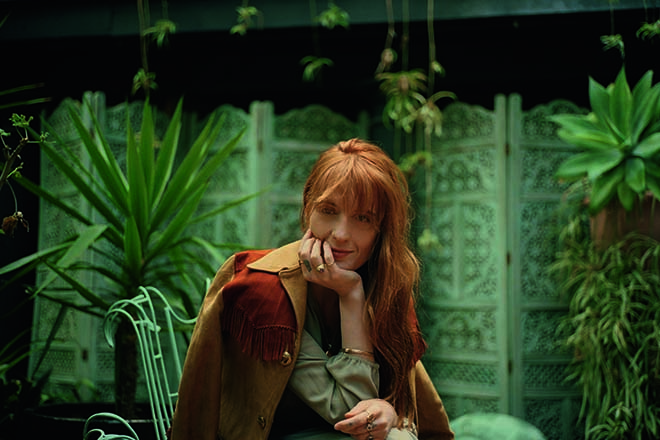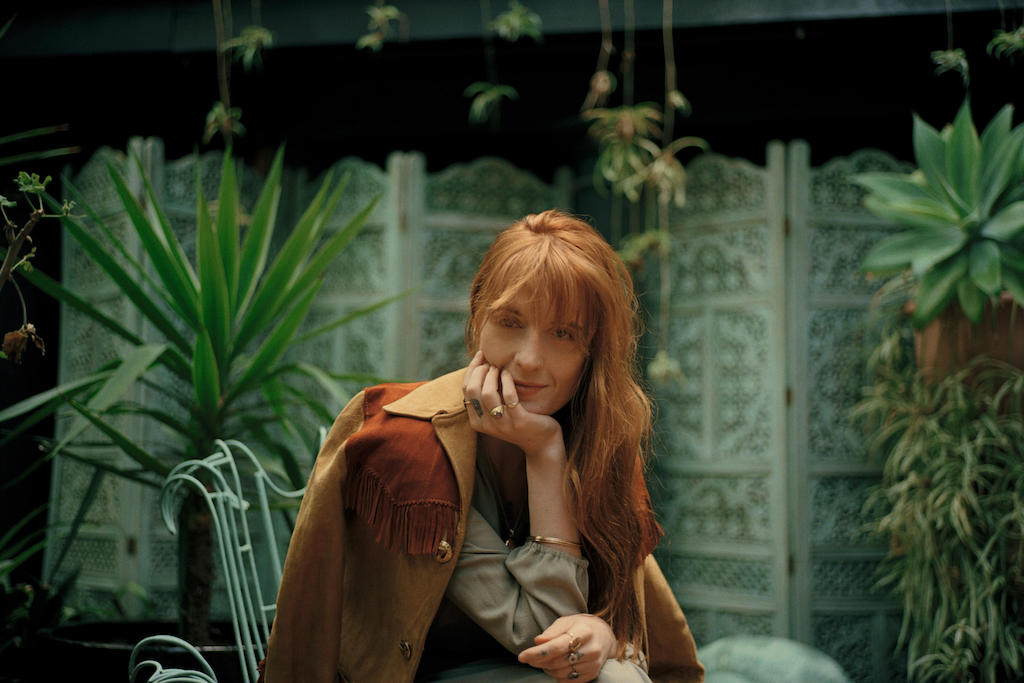With High As Hope, Florence + The Machine Returns To The Arena – And The Earth
Here, the usual fanfare is traded in for minimal arrangements and introspective lyricism.


Laneway Presents showcases what's fresh for genuine lovers of music.
Florence + The Machine has always been synonymous with grandiosity. Never doing things by halves, the band has always eyed-off wide-screen indie-pop in purely maximalist terms. Harps! Trumpets! Twenty layers of vocals! Kitchen sink? Why not!
This approach hadn’t yet steered Florence Welch and co. wrong across the course of three incredibly successful records with a combined 26 (!) platinum certifications between them and a slew of sold-out live shows across the globe.
Her live performances are things of legend – even when she was playing theatres, the shows felt arena-sized; by the time she hit arena status, they felt astronomical. If you’re thinking Florence + The Machine, you’re thinking big – in the best way possible.
It’s made her a festival headliner on a global scale, with a voice that could reduce a room to pin-drop silence one moment and rally an army to revolution the next. With a huge Australian tour announced for January, one suspects the grandeur will elevate to the highest level possible – a field full of fans and a sky full of song.
It’s the band’s first return to Australian shores since 2015, when they enchanted crowds in four huge back-to-back shows on the iconic Sydney Opera House forecourt.
What then, happens when this fantastical universe implodes? What becomes of a fallen, ruined empire? Welcome to High As Hope, album number four for the English group, in which the usual fanfare is traded in for minimal arrangements and strikingly introspective lyricism. For a band that has always gone out of its way to lead the parade procession, it’s startling to hear the opening strains of ‘June’ and wonder if this funeral dirge is being performed by the same act.
“Woke up in Chicago / When the sky turned black,” Welch croons mournfully – not to the mountains, not to the heavens, but quietly to herself; a kind of soliloquy.
Consider how the band’s albums – and, by extension, their live performances – have opened in the past: The harp swells of ‘Dog Days Are Over’. The baroque flourishes of ‘Only If For A Night’. The dazzling sing-along ‘Ship to Wreck’. All three can be considered standard-bearers of the musical spectrum Florence + The Machine traverses in their own ways. ‘June’ dismantles that in a matter of a minutes.
It’s still Welch – such a quintessential voice would still sound the same even if she was fronting a black metal band. The environment within which her voice is found, however, feels foreign. Rather than queen of the castle, Welch sounds like a stranger in a strange land.
Once the shock subsides, one grows accustomed to the sound they are working with – and, quickly, one finds a sense of worth. Primarily based around piano, the songs work with poise and restraint across the 40-minute runtime. Eschewing spectacle, Hope instead offers low-to-the-ground arrangements that don’t strain too far from their initial landscape.
When it comes to the peaks and valleys of a Florence + The Machine live show, one suspects that we can expect a lot more of the latter when High As Hope hits the stage in 2019 – moments of sombre reflection to take in before the highs of an earlier number raise the spirits. As in the tours that came before it, one isn’t meant to detract from the other, however – the contrasts are make the entire Machine catalogue so compelling, particularly within the live environment.
On paper, it may come across as safe or tired. In reality, it’s fascinating – shrouding themselves in darkness, Florence + The Machine fill out grey spaces and promptly surround you. Out the front of it all, Welch pushes a hitherto-unheard first-person narrative, landing her in the middle of what one might ostensibly refer to as “the real world.” She relies less on abstract metaphor and idiom, instead confronting her own demons head-on. “Jesus Christ, it hurts,” she seethes on ‘Big God.’ “Though I should know better / Well, I can make this worse.” Earlier in the song, she alludes to texting someone and getting left on “read” – which may be the single most modern reference in Florence + The Machine’s discography.
For an act that has always worked within its own concepts of time and space, it’s interesting to think of High as Hope in the sense of it being a record for these times – as Brian Wilson once put it, Welch just wasn’t made for them. Still, that’s the feeling one gets – it’s less about opening a book and more about being an open book. It’s a challenging album, but one that cuts deeper than any of the three before it – an album, one truly suspects, Welch and co. had to make, rather than simply wanting to.
Welch’s voice – crystalline and resonant as it’s ever been – is expertly complemented by long-time collaborators and newfound co-writers. Sampha adds distinctive piano playing to “Grace,” one of the album’s stand-out moments, while elsewhere Kamasi Washington adds horn arrangements, flickering beneath the greater sounds of the record and adding just a pinch of flair to the otherwise low-key affair. Miike Snow’s Andrew Wyatt co-writes ‘No Choir’, which arrives at the end of the album and sports some of Welch’s most blunt, raw-nerve lyrics to ever be committed to record.
The light used to encapsulate Florence + The Machine. Now, only a sliver gets through the cracks. By the time High as Hope finishes, however, you’re not afraid. You don’t feel alone, even though by all accounts you are. Welch has been your guide this far, and she’s not about to give up on you yet.
—
Outro
